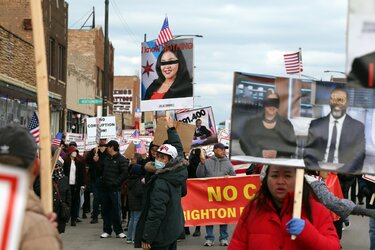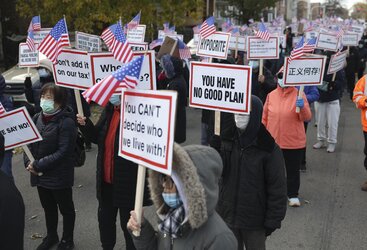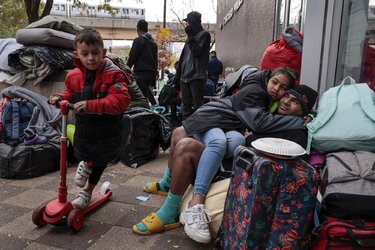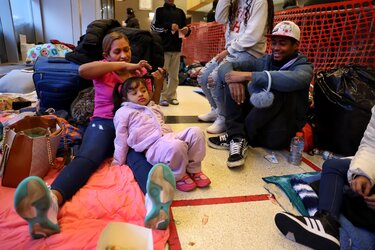Hundreds march in Brighton Park to protest tent encampment for migrants
Chicago Tribune (
archive.ph)
By Nell Salzman, Alice Yin, and A.D. Quig
2023-11-11 00:05:00GMT
 People protesting against the possible construction of a winterized tent camp for migrants on a vacant lot at 38th Street and California Avenue in Chicago, march on Archer Avenue on Nov. 10, 2023. (Terrence Antonio James/Chicago Tribune)
People protesting against the possible construction of a winterized tent camp for migrants on a vacant lot at 38th Street and California Avenue in Chicago, march on Archer Avenue on Nov. 10, 2023. (Terrence Antonio James/Chicago Tribune)
Hundreds turned out Friday afternoon in Brighton Park to march in protest of Mayor Brandon Johnson’s plan to erect winterized tents to house 2,000 migrants in an empty parking lot.
Many residents of the neighborhood — which has historically been a haven for immigrants — are worried about the plan to house thousands of migrants. They think politicians are not listening to them.
Ruth Diaz, a Mexican American who has lived in Brighton Park for 33 years, was one of about 300 people who turned out for the march.
Diaz said the close to 21,000 migrants who have arrived since last August have not had to work for what they’re being given by the city. She owned a grocery store near the proposed site and said she worked hard to send her daughter to nursing school.
She held a sign that said: “Protejan nuestra comunidad. Protect our community.”
“The migrants want everything in a dish ready to eat,” she said. “Why do they get off so easy?”
The protest came as the city continues an environmental assessment to determine whether it’s safe to have people live on the property. Johnson
signed a six-month, $548,400 land use contract on Oct. 26. for the location on the corner of 38th Street and California, but a final determination is awaiting the outcome of that study.
 Protesters walk down West 38th Street during a protest in Brighton Park on Nov. 10, 2023 against a proposed migrant camp at 38th and California. (Trent Sprague/Chicago Tribune)
Protesters walk down West 38th Street during a protest in Brighton Park on Nov. 10, 2023 against a proposed migrant camp at 38th and California. (Trent Sprague/Chicago Tribune)
County property records show the Brighton Park site is owned by Barnacres Corp., a Markham-based company helmed by Otoniel “Tony” Sanchez. Sanchez is the president or manager of several other businesses registered to the same Markham address, including Sanchez Paving Co., which offers concrete, as well as asphalt paving, patching and overlay, according to its website.
Sanchez was also a Johnson donor, giving $1,500 to the mayor’s political fund in August, two months before the city signed the land use contract with his site on 38th and California. On Friday, Johnson’s campaign announced it was returning 30 donations totaling $46,500 in campaign contributions following a Sun-Times investigation that found city contractors were donating to the mayor against the ethics rules.
Bill Neidhardt, political adviser to Johnson, said in a Friday statement that the $1,500 contribution had no influence on the base camp site decision. He said city workers involved in scouting locations did not know about the donation and received an unsolicited “inquiry” about the Brighton Park property.
“The mayor did not solicit this contribution and was unaware of this contribution until its return this month,” Neidhardt said. “This particular parcel came from an unsolicited inbound inquiry addressed to city personnel tasked with identifying properties and who did not have any knowledge of this minor campaign contribution. The decision to advance this property was based solely on the standard analysis performed on all such properties by said personnel.”
A number listed under Sanchez went unanswered Friday.
 People look on from their residence as protesters against the possible construction of a winterized tent camp for migrants march to the Archer Avenue office of Ald. Julia Ramirez, 12th, on Nov. 10, 2023. (Terrence Antonio James/Chicago Tribune)
People look on from their residence as protesters against the possible construction of a winterized tent camp for migrants march to the Archer Avenue office of Ald. Julia Ramirez, 12th, on Nov. 10, 2023. (Terrence Antonio James/Chicago Tribune)
Sanchez also appears to have a role in another asphalt company, MAT Asphalt, which is headed by Michael Tadin Jr., son of longtime city contractor Michael Tadin, who was tight with former Mayor Richard M. Daley and whose businesses received tens of millions of dollars in city contracts. The elder Tadin was part of the city’s Hired Truck Program, which was halted in 2006 after city officials and trucking contractors were indicted in massive bribe schemes that led to dozens of convictions.
The $46,500 pot of money being returned from Johnson’s campaign coffers also includes checks from Tadin Jr., who has business ties with Sanchez. In a phone interview, Tadin Jr. denied that he ever profited from Sanchez’s recent land use agreement.
“That property has nothing to do with me or any family member of mine,” Tadin Jr. said about the potential base camp site. “We don’t own any properties together.”
Johnson’s political director Christian Perry also said “absolutely not” when asked whether Tadin Jr.’s contribution was at all tied to the 38th and California deal. He added that a nationally based compliance team used the wrong ethics guidelines in an “oversight” corrected more than a month ago.
“These contributions were mostly made at fundraiser events where our campaign provided instructions to follow all city campaign finance rules for city contractors and lobbyists, and a vast majority of those who attended complied with those rules,” Perry said.
With over 2,500 migrants sleeping in and around police stations and at O’Hare International Airport, Johnson’s administration is hastily trying to come up with a solution to ensure migrants have a roof over their heads and a warm place to stay for the winter. There are 25 active shelters in vacant buildings housing migrants around Chicago, and more arriving on buses and planes from border cities every day.
Ald. Julia Ramirez, 12th, was not notified that the lease for the site in her ward had been signed before news of the signing spread, she said in a statement shared with the Tribune Nov. 3.
City construction crews began work at the proposed site in October, increasing tensions in the community.
Protesters swarmed Ramirez at one mid-October demonstration in what Johnson condemned as a “violent act.” Demonstrations against the tent proposal haven’t ceased since.
 Hundreds of people against a proposed tent city for migrants in Brighton Park protest in front of Ald. Julia Ramirez's office on Nov. 10, 2023. (Trent Sprague/Chicago Tribune)
Hundreds of people against a proposed tent city for migrants in Brighton Park protest in front of Ald. Julia Ramirez's office on Nov. 10, 2023. (Trent Sprague/Chicago Tribune)
---
Migrant family journeys back to Venezuela, more leaving Chicago as winter looms: ‘The American Dream doesn’t exist anymore’
Chicago Tribune (
archive.ph)
By Laura Rodriguez Presa
2023-11-12 11:00:00GMT
 A migrant child scooters past Venezuelan migrants Michael Castejon and daughter, Andrea Sevilla, wait for a ride-share at the 1st District police station in Chicago, Nov. 3, 2023. They were heading to O’Hare International Airport to get to Texas and then back to Venezuela. (Antonio Perez/Chicago Tribune)
A migrant child scooters past Venezuelan migrants Michael Castejon and daughter, Andrea Sevilla, wait for a ride-share at the 1st District police station in Chicago, Nov. 3, 2023. They were heading to O’Hare International Airport to get to Texas and then back to Venezuela. (Antonio Perez/Chicago Tribune)
Over the past five months since arriving in Chicago, Andrea Carolina Sevilla’s parents have been unable to enroll her in school even though the reason they left everything behind in their native Venezuela was for her to have access to better education.
In Venezuela, she said, she was lucky she could even attend school. Many other teenagers start working at an early age to help out their families, who often face extreme poverty.
But she did not have the same luck in the city that she once dreamed of visiting. The family went from sleeping on the floor of a police station, to a crowded shelter, to a house on the Far South Side, and then back to the floor of the police station after her stepfather Michael Castejon, 39, couldn’t afford the rent. He could not find a job that paid enough without a work permit, he said.
On Nov. 3, they set out to go back to Texas. And from there, they would go to Venezuela, the country they fled to seek asylum in the United States. They’re among the countless number of migrants who have chosen to leave Chicago in recent weeks in their search for a better life. They’re looking for warmer weather, more resources or to reunite with friends and family in other places.
 Yorbelis Molero, 16, second from left, says goodbye to a friend as Molero and her family of five wait to leave a Chicago police station and head to a Greyhound bus station on Nov. 2, 2023. The migrant family is leaving Chicago for Detroit. (Chris Sweda/Chicago Tribune)
Yorbelis Molero, 16, second from left, says goodbye to a friend as Molero and her family of five wait to leave a Chicago police station and head to a Greyhound bus station on Nov. 2, 2023. The migrant family is leaving Chicago for Detroit. (Chris Sweda/Chicago Tribune)
One family of five left for Detroit because another migrant told them there was work there. One man went back to Texas, where he will join his cousins after trying his luck in Chicago. In the past month, at least 40 people, including Sevilla’s family, have left Chicago from the 1st District station on the Near South Side with the help of Catholic Charities of Chicago.
“The American Dream doesn’t exist anymore,” said Castejon as he laid on a blanket on the bare floor of the station the afternoon before they left. “There’s nothing here for us,” he added.
Migrants said they’re realizing the city is at a breaking point. Not only is there no more space in shelters, they also acknowledge that some residents in Chicago oppose the opening of more shelters for them. Castejon said that despite the dangerous trek to get here — often begging for money and sleeping in the streets to cross several borders — the journey had not been worth it.
 Migrants Michael Castejon and wife Induliz Seville, wait for an Uber ride from the 1st District police station in Chicago to O’Hare airport on Nov. 3, 2023, as they try to return to Venezuela. (Antonio Perez/Chicago Tribune)
Migrants Michael Castejon and wife Induliz Seville, wait for an Uber ride from the 1st District police station in Chicago to O’Hare airport on Nov. 3, 2023, as they try to return to Venezuela. (Antonio Perez/Chicago Tribune)
His attempts to settle in the city failed. He said he never felt comfortable in a shelter, and that the hot meals, stipends and good jobs he’d heard about from other migrants never materialized. The father didn’t consider that once in the country, the family wouldn’t be granted asylum immediately and or even get a work permit while they wait.
It could have been misinformation, he said. Or that the benefits that those who arrived in the city before him, are no longer available because of the amount of people now here. But even after hearing that the temporary protected status (TPS) program was expanded and the process to get job permits could be accelerated, he decided he was exhausted and chose not to wait.
“We didn’t know things would be this hard,” he said. “I thought the process was faster.”
More than 2,000 people have gotten monetary aid from the state through Catholic Charities to relocate to other states with family and friends, according to Katie Bredemann, a spokesperson with Catholic Charities of Chicago. The program has been part of their effort to help ease the humanitarian crisis in Chicago and offer the migrants an opportunity to reunite with families or reach the city they intended to go to before being sent to Chicago.
“The state of Illinois determines who is eligible for relocation to other states, then Catholic Charities assists in helping to help make the travel arrangements,” Bredemann said in an email.
But while some migrants are choosing to leave, many more still arrive every week. In what could be considered a revolving door for taxpayers, for example, Catholic Charities of Chicago is using Illinois taxpayer money to transport the migrants who want to return to Texas or to other states while simultaneously the Catholic Charities of San Antonio and the city of Denver are using federal taxpayer money to send new migrants to Chicago.
As of Friday, there were 20, 700 migrants who have arrived in Chicago since August 2022 when Texas Gov. Greg Abbott began sending migrants to sanctuary cities such as Chicago, in part to protest federal immigration policies.
Castejon said Chicago wasn’t what they expected when they arrived in June. But the father was determined to succeed, he said.
The family was first taken to the 1st District police station where they stayed for a couple weeks before getting transferred to Wright College with hundreds of other asylum-seekers. The family lived there for about a month before moving into a house with another migrant who was renting an apartment through a
city voucher program that offers up to $15,000 for up to six months of rental assistance.
But when rental assistance vanished, neither could afford rent, so they were once again homeless, the father said.
They eventually met someone who offered to rent them an apartment for $750. They managed to afford it because Castejon had found a job in construction, where he was getting paid in cash. But the work was heavy and the pay was not enough, he said, so he left.
Unable to pay rent, the family returned to the 1st District station, where they waited about two weeks before packing their belongings, mostly collected through donations, and headed back to Venezuela.
As the patriarch, he said he felt powerless not being able to provide for his wife and daughter, he said.
“How many more months of living in the streets will it take? No, no more. It’s better that I leave. At least I have my mother back home,” he said angrily.
He said the family decided to seek asylum in the United States because of the extreme poverty in which they were living in Venezuela’s authoritarian regime. But the trip was not worth it, he said.
“We just want to be home,” he said. “If we’re going to be sleeping in the streets here, we’d rather be sleeping in the streets over there.”
The first few colder days influenced the family’s decision to contact staff at Catholic Charities, pressing for plane tickets that would put them closer to a border town to find a way back home. When they got the news that they had been approved and had their tickets in hand, Castejon felt relieved, he said.
The feeling of disappointment and impotency that Castejon felt is shared by many of the migrants, said Brayan Lozano, head of the volunteer group of the Police Station Response Team at the 1st District station.
 Brayan Lozano, an asylum-seeker from Colombia who has become a leader of the mutual aid group at the 1st District police station, talks with migrants camped outside the station on Oct. 6, 2023. (Chris Sweda/Chicago Tribune)
Brayan Lozano, an asylum-seeker from Colombia who has become a leader of the mutual aid group at the 1st District police station, talks with migrants camped outside the station on Oct. 6, 2023. (Chris Sweda/Chicago Tribune)
As an asylum-seeker himself, Lozano understands firsthand the experience the migrants go through: the environment they’ve escaped from their native countries and their expectations for the United States, which may have been influenced by social media and word-of-mouth from the first group of migrants who arrived in Chicago. There may have been more resources when they first came in August 2022, he said.
Even though many, including Castejon’s family, are leaving, others still hope to eventually find shelter in hotel rooms, get access to public services and cash assistance or live out the American Dream.
A proposed ballot question asking Chicagoans whether the city should keep its designation as a sanctuary city has roiled the City Council in recent weeks and immigrant- and Black-led groups gathered Thursday morning across the street from City Hall to urge “solidarity, not division” in responding to the migrant crisis.
“Like many people, we’re just here for a better life. I’m grateful to God and I’m just following a dream to be able to offer more to my family,” said Ana, a Venezuelan teacher who came to Chicago in September because she could not afford to live on the pay she was making at home.
The teacher spoke in Spanish through a translator.
“I am here to continue to advocate for Chicago to be a sanctuary city, for there to be resources for everyone, for us immigrants, to continue to receive the help that we deserve, because everyone deserves a sun to shine on them,” she said.
Lozano said there are several migrants who transitioned from sheltering in suburban hotel rooms into apartments with the help of the city and state resettlement program, received assistance to file their asylum cases, found jobs working under the table, like many people who live in the country without authorization do, and are settling in the city.
But the resources have been exhausted for more recent arrivals and the resettlement program has been trumped by the number of migrants who are arriving.
Lozano said that there is a lot of misinformation flowing within the asylum-seeking community about what is actually happening in Chicago.
As snow and rain have come with the colder temperatures, the reality for migrants stuck sleeping outside of police stations has grown dire. Mattresses are wet, the smell inside tents is sticky, humid and pungent. They eat standing up, rubbing their hands together to keep warm.
“The word of the situation in Chicago is beginning to spread,” Lozano said.
Jose Nauh, 22, decided to give Texas another shot and returned earlier this month after sleeping in a police station in Chicago for more than two weeks.
He came to Chicago even though he has family in Houston because the ticket was free, he said, and he wanted to see what the buzz was all about.
Like Castrejon, he heard there was shelter, food and other public benefits. “That’s not true,” he said.
He grabbed a pink backpack, waved goodbye to Lozano, and rushed into a white car that took him to O’Hare International Airport to board a plane back south.
 Diana Vera combs daughter Ana's hair as the extended family of five prepares to leave the Chicago Police Department’s 1st District station en route to the Greyhound station on Nov. 2, 2023. (Chris Sweda/Chicago Tribune)
Diana Vera combs daughter Ana's hair as the extended family of five prepares to leave the Chicago Police Department’s 1st District station en route to the Greyhound station on Nov. 2, 2023. (Chris Sweda/Chicago Tribune)
That same day Diana Vera, her three children and daughter-in law boarded a bus to Detroit, hoping that a cousin would take them in once they arrived.
“We heard that there are a lot of jobs over there even if you don’t have a permit,” the mother said as she brushed her hair while sitting on a blanket on the floor of the police station that had been their home for nearly a month.
Vera also was discouraged from staying after hearing from migrants at city shelters that the conditions are overwhelmed with people, the food is cold and there are no real beds.
“It sounds worse than sleeping at the police station,” she said.









